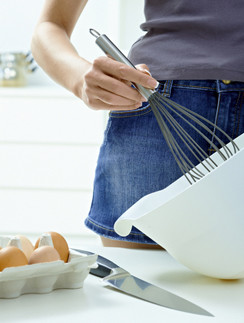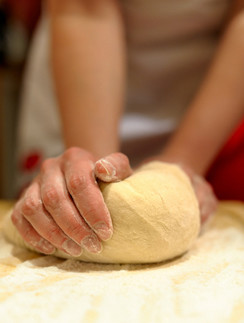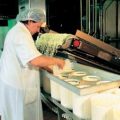 How to learn to cook deliciously Photo: Dreamstime
How to learn to cook deliciously Photo: Dreamstime Why cook at home?Photo: DreamstimeHer choice is expensive semi-finished products in beautiful boxes. Well, that is if she and her family dine at home. But it is better, of course, in a restaurant. The quality of food worries her less than the quality of clothes and cosmetics. Although, in principle, good food is the same way to take care of yourself and your body. If we choose expensive cosmetics and high-quality underwear, fitness, swimming pools and spas, then why do we allow store-bought dumplings, bouillon cubes, ready-made sauces and other culinary garbage into our kitchens? There is a good French proverb: "What you don't pay the butcher extra, you pay the pharmacist". Why is the art of cooking considered a "low-skilled" job, and cooks are considered servants? Maybe because anyone over the age of ten can whip up dinner or something resembling dinner? No special talent is required to "fry an egg" or make broth. What is the ability to cook: following recipes precisely or, on the contrary, ignoring them? Neither one nor the other. In the art of cooking, as in all other areas of human activity, both talent and an intuitive understanding of the process are important, but one cannot do without knowledge and experience. Of course, you can consider that if "darling ate the purr", then this is the highest recognition of your culinary exercises, and you are already a pro. Or adapt a classic recipe to your diet or taste and claim that you have invented a new dish. But the ability to bake sauces intended for cold dishes in the oven is not know-how, but a lack of professional skills (or, at best, the disposal of a sauce whose shelf life is ending). When I studied at the screenwriting department, they explained a very simple thing to me there: before composing masterpieces of auteur cinema, you need to learn how to make "stools", clear simple genre plots. With the art of gastronomy, things are exactly the same. Before experimenting with taste, varying ingredients and neglecting the rules of the game, it would be good to master the most basic operations. You should not call every culinary failure your "signature dish" with the argument "but my family likes it this way!" Before you cook something "original", cook the "classic" a hundred times first. Only then will you understand everything about this borscht or chops and be able to evaluate what is superfluous and what is missing. You will understand the whims and features of your stove and oven, learn to "vary" ingredients depending on the season or the contents of your refrigerator. I have been professionally engaged in the kitchen for five years now. At the same time, I still cannot say that I can cook everything-everything-everything. No, I just have an idea of the properties of products and can cook several dishes. But those dishes that I will name in the list of my skills and talents, with them I am really "on a first-name basis". I can cook them in a foreign kitchen, in a foreign country (from unfamiliar products), on a gas stove, an electric stove, and even over a campfire. Do you want to learn how to cook? Start your culinary career with a simple and enjoyable dish - but it will certainly awaken in you the desire to continue experimenting!
Why cook at home?Photo: DreamstimeHer choice is expensive semi-finished products in beautiful boxes. Well, that is if she and her family dine at home. But it is better, of course, in a restaurant. The quality of food worries her less than the quality of clothes and cosmetics. Although, in principle, good food is the same way to take care of yourself and your body. If we choose expensive cosmetics and high-quality underwear, fitness, swimming pools and spas, then why do we allow store-bought dumplings, bouillon cubes, ready-made sauces and other culinary garbage into our kitchens? There is a good French proverb: "What you don't pay the butcher extra, you pay the pharmacist". Why is the art of cooking considered a "low-skilled" job, and cooks are considered servants? Maybe because anyone over the age of ten can whip up dinner or something resembling dinner? No special talent is required to "fry an egg" or make broth. What is the ability to cook: following recipes precisely or, on the contrary, ignoring them? Neither one nor the other. In the art of cooking, as in all other areas of human activity, both talent and an intuitive understanding of the process are important, but one cannot do without knowledge and experience. Of course, you can consider that if "darling ate the purr", then this is the highest recognition of your culinary exercises, and you are already a pro. Or adapt a classic recipe to your diet or taste and claim that you have invented a new dish. But the ability to bake sauces intended for cold dishes in the oven is not know-how, but a lack of professional skills (or, at best, the disposal of a sauce whose shelf life is ending). When I studied at the screenwriting department, they explained a very simple thing to me there: before composing masterpieces of auteur cinema, you need to learn how to make "stools", clear simple genre plots. With the art of gastronomy, things are exactly the same. Before experimenting with taste, varying ingredients and neglecting the rules of the game, it would be good to master the most basic operations. You should not call every culinary failure your "signature dish" with the argument "but my family likes it this way!" Before you cook something "original", cook the "classic" a hundred times first. Only then will you understand everything about this borscht or chops and be able to evaluate what is superfluous and what is missing. You will understand the whims and features of your stove and oven, learn to "vary" ingredients depending on the season or the contents of your refrigerator. I have been professionally engaged in the kitchen for five years now. At the same time, I still cannot say that I can cook everything-everything-everything. No, I just have an idea of the properties of products and can cook several dishes. But those dishes that I will name in the list of my skills and talents, with them I am really "on a first-name basis". I can cook them in a foreign kitchen, in a foreign country (from unfamiliar products), on a gas stove, an electric stove, and even over a campfire. Do you want to learn how to cook? Start your culinary career with a simple and enjoyable dish - but it will certainly awaken in you the desire to continue experimenting!

Making Money with Desserts: Success Stories
Evgeniya Polischuk (Fedutinova) instagram:@evgeniyafedutinovavk.com/janeshomebaking– It all started with baking for family and friends. Gradually, I started posting photos of my baked goods on Instagram – and orders started coming in. I made my first custom-made cake on October 13, 2014, and a little earlier I started making macaroons and cupcakes. You could say that the business “found me”, I am very […]

Soups are cold recipes with photos
Cold cucumber soup with yogurt and lemonsorbet from the chef of the restaurant La Taverna Alexander Zhurkin Photo: Getty Images Ingredients: Plain yoghurt – 125 g Cucumber – 150 g Lemon/lime sorbet – 50 g Cocktail shrimp – 24 g Fresh ginger juice – 1 g Lime juice – 5 g Fresh orange juice – 5 g Parsley – 1 g Pink pepper – 1 g Watercress – […]

barbeque kebab
Pork tenderloin in glaze Photo:Dmitry Bayrak/dbstudioPreparation time: 20 minutes + marinating time.Calories: 454 kcal per serving.For 4 servings: 4 pork tenderloins (approximately 300 g each), 1 onion, 2 cloves of garlic, 1 tsp. lemon zest, 1 tsp. lemon juice, a pinch of ground cumin, coriander and turmeric, 1 tbsp. vegetable […]

Pierre Duacan: dietary recipes: Ducane diet
Beetroot soup Photo:Season’S, Luxury Hotels RepresentationYou will need:· Boiled beetroot – 60 g· Fresh cucumbers – 20 g· Red radish – 20 g· Green onions – 10 g· Egg – 1 pc.· Drinking mineral water – 200 g· Salt – 1 gPreparation:· Boil the egg and beetroot.· Grate the cucumbers, radish and part of the beetroot. Put everything […]





